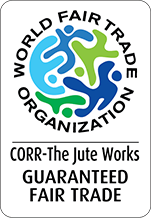About CJW
CORR-The Jute Works is a registered Fair Trade Trust of producing and marketing handicrafts incepted in September 2, 1973. It is also a pioneer member of World Fair Trade Organization (WFTO) previously known as IFAT.
After the War of Independence in 1971, aiming at ameliorating the plights of the war widows, war victims and marginalized rural women, who became dependent on relief and sympathy, CORR (Christian Organization for Relief and Rehabilitation), now Caritas Bangladesh, carried out a program of reconstruction. In August 1972, CORR received a letter from CARE New York office. One Design Firm Lesley & Co of New York had offered to help with the development of the handicrafts in Bangladesh. In January 1973 a young designer, Louisa Brooke came to Dhaka for a six week period of observation. She found that a handicraft training Centre already existed, the Jagorani Centre, run by two Catholic Nuns: Sr. Michael Francis, CSC and Sr. Mary Lillian, SMRA. Rural women were trained producing of jute and other crafts for eight weeks in the centre which were sold locally. Hence, they involve in a part-time employment at home earning a supplementary income for the family. The two sisters started organizing village groups and training provided by Louisa Brooke.
In June 1973, Harley Snyder, a CPA was seconded to CORR by Mennonite Central Committee (MCC) for two years for organizing a central organ for jute crafts. Rev. Fr. Richard William Timm, CSC drew up a plan for a cooperative handicraft project, which would be exclusively for women. The rural artisan groups were to form the primary cooperatives and CORR-The Jute Works (CJW), the Centre, would ultimately become a central handicraft organization. An export license obtained in the name of CJW. CJW got underway in September 02, 1973.
CJW opened for the first eight months in the unused two room garage of Oxfam. Oxfam helped in testing the foreign market through their shops in England. The Oxfam Country Director in Bangladesh also served in the Managing Committee of CJW for the first two years. International Rescue Committee contributed the cost of three local employees in the first year of operation. MCC, Concern, Enfant du Monde, YWCA, CHCP and a few smaller organizations gradually became associated with CJW because of their involvement with income generating activities for the poor women. They formed artisan groups and received training through CJW. Rev. Peter McNee, a missionary from New Zealand on behalf of CJW, voluntarily took the responsibility to find foreign markets for these crafts. The Third World Shops (now known as Fair Trade Organizations – FTOs/ATOs) sold the crafts of the rural women artisans, through their shops. Gradually an export market was established to flourish and expand over the years providing employment to increasingly needy rural women. CJW exported handicrafts to different foreign markets in favour of the poor and grassroots women artisans to ensure their fair wage which lead them to live in dignity. CJW ensures ‘Trade - not aid’ through its work.




